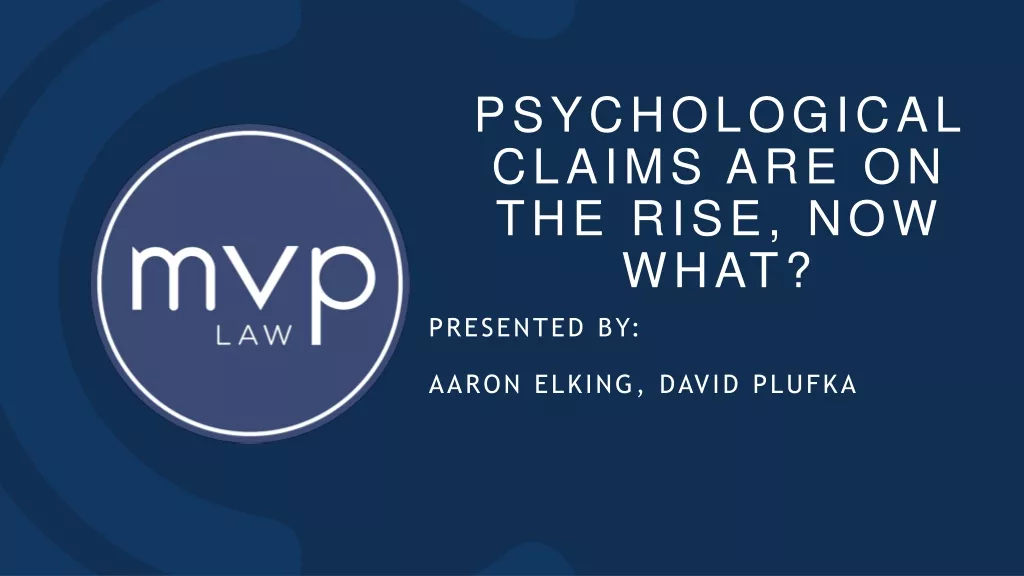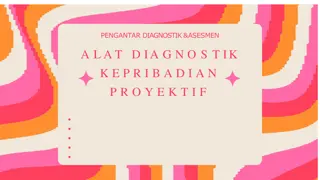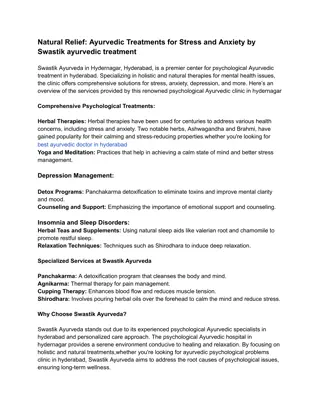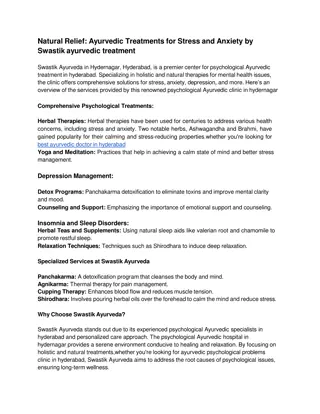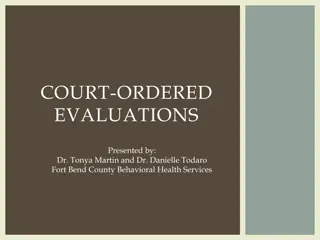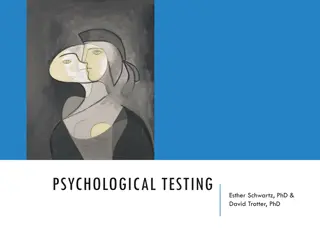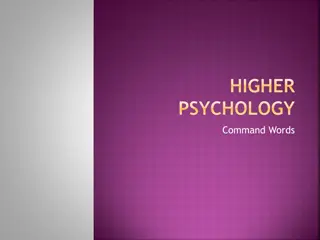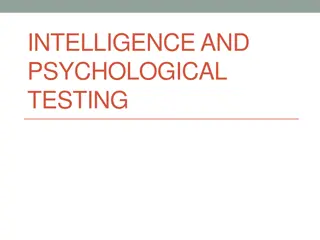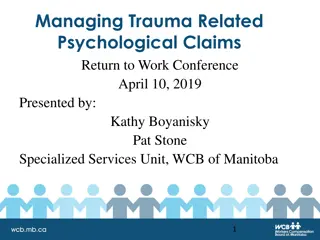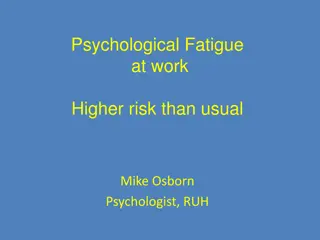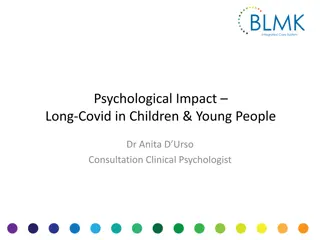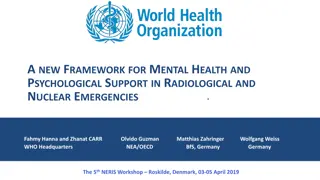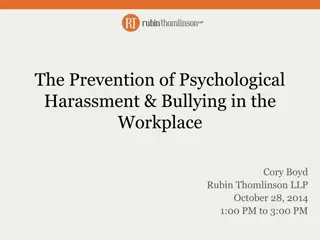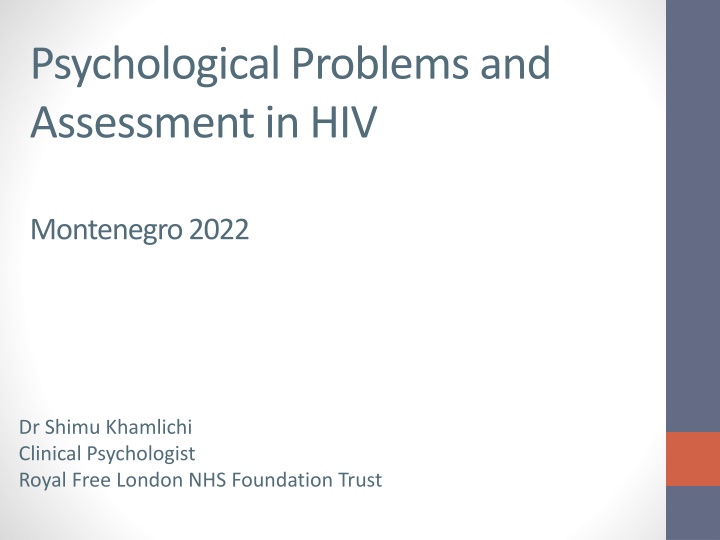
Psychological Challenges in HIV Patients: Assessment and Treatment Insights
Explore the psychological difficulties faced by individuals living with HIV, including depression, anxiety, and adjustment disorders. Learn about the common symptoms, diagnostic criteria, and treatment options for these mental health issues in the context of HIV care.
Download Presentation

Please find below an Image/Link to download the presentation.
The content on the website is provided AS IS for your information and personal use only. It may not be sold, licensed, or shared on other websites without obtaining consent from the author. If you encounter any issues during the download, it is possible that the publisher has removed the file from their server.
You are allowed to download the files provided on this website for personal or commercial use, subject to the condition that they are used lawfully. All files are the property of their respective owners.
The content on the website is provided AS IS for your information and personal use only. It may not be sold, licensed, or shared on other websites without obtaining consent from the author.
E N D
Presentation Transcript
Psychological Problems and Assessment in HIV Montenegro 2022 Dr Shimu Khamlichi Clinical Psychologist Royal Free London NHS Foundation Trust
Agenda Psychological Problems in HIV population General Psychological Assessment Later today Psychological Treatment Psychological Tools
Section 1: Psychological Problems in HIV population
Psychological Issues in HIV Higher rates of psychological difficulties in HIV (1) Potential difficulties during transition incl. (2) HIV+ test: grief reaction / adjustment Being HIV+: identity, stigma, self-esteem Co-morbid: pre-existing mental / physical health problems Disclosure: managing relationships & sex Medication: starting, changing, adherence, managing side-effects Major life decisions: work, marriage, pregnancy, housing, benefits, immigration, criminalisation etc complicated by HIV? Long-term issues: pain, fatigue, illness, hospitalisation, HIV- related cognitive impairments, palliative care
Depression and Anxiety Most common mental health problems in PLWH PLWH are more likely to experience depression, anxiety and adjustment disorders than other MH problems (1 London study) Nearly twice as likely to be diagnosed w depression than gen pop (2) Symptoms of depression incl. low mood, hopelessness, self- critical thoughts (self-blame, shame, regret, guilt), changes in sleep, and a lack of pleasure in activities Symptoms of anxiety incl. worries about leading a healthy life and relationships; fear of rejection, managing day-to-day challenges; uncertainty about their future
Depressive Disorders DMS-5 Presence of 5+ symptoms during the 2-week period and one symptom should be either (1) depressed mood or (2) loss of interest/pleasure Depressed mood nearly every day Diminished interest or pleasure in activities Sig. weight loss, or decrease or increase in appetite A slowing down of thought and physical movement Fatigue or loss of energy Feelings of worthlessness or inappropriate guilt Diminished ability to think or concentrate Recurrent thoughts of death, recurrent suicidal ideation with or without out plan, attempt
Generalised Anxiety Disorder -DSM-5 The presence of excessive anxiety and worry about a variety of topics, events, or activities Worry occurs more often than not for at 6 months Worry is difficult to control Anxiety and worry are accompanied with 3> of the following physical or cognitive symptoms: Edginess or restlessness Tiring easily; more fatigued than usual Impaired concentration / mind goes blank Increased muscle aches or soreness Difficulty sleeping (due to trouble falling asleep or staying asleep, restlessness at night, or unsatisfying sleep)
Adjustment Issues Receiving a diagnosis of HIV can be psychologically traumatic It can resemble the grief process (1) Denial (shock, fear, worry) Anger (irritation, anxiety) Bargaining (struggling to find meaning, reaching out) Depression (helplessness, flight) Acceptance (moving on, exploring options)
Trauma Trauma: distressing experience that can result from a situation, an event, a series of events that is harmful (physically / emotionally) People respond to trauma differently. Some common and normal reactions include: Anxiety Depression Stress Anger Changes in sleep, eating, substance use Most survivors reactions are normal Increased vulnerability to trauma if already suffered losses For some, reactions do not go away and can get worse over time
HIV and PTSD Prevalence of Trauma / Post Traumatic Stress Disorder (PTSD) among PLWH is sig. higher than gen pop (12) Several PTSD risk factors include: a) Higher likelihood of trauma exposure at an early age and repeated exposure to physical and sexual abuse, and crime- related violence (13) b) Diagnosis of HIV can constitute a traumatic event. PLWH with PTSD indicated that their index trauma (the worst event experienced) was being diagnosed with HIV (14) c) Many PLWH live in environments characterized by poverty, violence, and a lack of social support, all risk-factors (15)
HIV, women and PTSD Women living with HIV suffer from PTSD sig. higher rates than women in gen (16) Estimated rate of sexual assault is 30.3 % (13) to 68 % (16), which is several times higher than the rate among women in gen pop These traumas are often kept alive or worsened by the stigma, discrimination, gender, and bias experienced in health care settings and in women's home communities Women living with HIV in the US who had suffered recent trauma were much more likely to experience HIV treatment failure and to not remain virally supressed (17)
Trauma in Long term survivors HIV long-term survivors have had multiple traumatic events which can affect physical & mental health (18) Death sentence believing they would die young Watching friends die Isolation and loneliness Financial instability: due to gaps in work histories Physical health concerns including decades of taking drugs toxicity? side effects, treatment fatigue and tolerability? comorbidities?
PTSD: DSM-5 Exposure: actual or threatened injury or death direct, witnessed, hear Symptoms lasts at least 1 month & cause sig distress /functional impairment: Intrusion symptoms (1+) Re-living or re-experiencing the trauma: nightmares, flashbacks, intrusive memories of the event, intense psychological /physiological reactions to reminders Avoidance symptoms (1+) Avoiding or staying away from people, places that remind of traumatic event Negative Cognitions and Mood (2+) unable to remember important aspect of the event; negative beliefs about self, world, others; self-blame or blaming others; diminished interest/participation in sig activities; feelings of detachment from others; negative emotional state Hyperarousal (2+) poor sleep; irritability/angry outbursts; hypervigilance; poor concentration; exaggerated startle response
Consequence of untreated Trauma History of trauma and untreated PTSD can lead to comorbid major depression and substance use disorders (19), risky sexual and drug behaviour (20), low quality of life (21), non-adherence to HIV drugs, treatment failure, higher rates of death (18)
Other Common HIV Specific Issues Stigma and discrimination HIV is a highly stigmatised disease; can effect self-esteem - Spoiled identity (1,2) Low Self-Esteem HIV associated with promiscuity , uncleanliness immorality (1); these concepts can create poor self-image, shame and self-criticism Disclosure anxiety & depression due to fears of rejection, criticism, concern by partners, friends, family, employers Relationships diagnosis can impact ability to form & maintain relationships; worries about rejection, having a baby, testing sig. others
Common HIV Specific Issues Chemsex Use of GHB/GBL, crystal meth, mephedrone during sex is high among gay men with HIV (3,4) . Triggers incl. more intimacy, low self-esteem, escaping unpleasant emotions, loneliness, boredom Sleep problems - more common in PLWH than gen. pop with a high prevalence ranging from 30% to 100% (10). Poor sleep quality associated with depression, anxiety, stress, substance abuse, poverty, ART medication, lack of family/social support and internalised HIV-stigma (11)
If these psychological problems are unmanaged, it can lead to adherence issues, poor health outcomes, frequent hospital admissions and increased mortality
Section 2: General Psychological Assessment
Psychology Service: The dilemma Not all HIV clinics have mental health provisions A lack of support services = lack of assessment This means other members i.e., medical and nursing team may have to screen for expected mental health problems Some interventions can be offered by trained HCPs More specialist psychological interventions should be provided by psychiatrists and psychologists for more severe / complex
Psychological Screening HCPs can offer psychological screening Via Annual health screen Brief screening = PHQ2, GAD2 shortened scales for depression/anxiety HCPs should refer patients if more complex (psychology, GP/community, local HIV charities, peer support groups)
Annual Health Screen example GAD (generalised anxiety disorder): Total score 3 suggests anxiety. PHQ-2 (patient health question-2): Total score 3 suggests depression. Further discussion and/or onward referral to psychology service
Mental Health Assessment Preparation Be prepared to not collect all information Consider the reason for the referral - Why were they referred? Why now? Are there risks, adherence, substance use, practical issues? During Assessment Build positive rapport Show genuineness, empathy, unconditional positive regard Good listening skills and work collaboratively Attending to non-verbal communication and silence Managing distress Avoid making assumptions What ideas / assumptions do you have about this person or their HIV status? How might these affect the way you work or act towards them? How would you prefer to be with them?
Mental Health Assessment Preparation During assessment Arrive at a clear problem description (rarely one problem) Clarify & summarise Discuss possible solutions (lifestyle and behavioural changes) Post-assessment Follow up appointment Discuss with MDT Refer on for specialist psychological assessment and intervention
Basic Mental Health Assessment Assess for psychological difficulties that may hinder treatment adherence, coping with condition or/and impacts upon risk behaviour and HIV transmission Introduce I would like to ask you some questions about your mental health and any difficulties you might be having. I may be able to assist you now and make decisions regarding where we may go from here Confidentiality and Note-Keeping The information you disclose to me will not be disclosed to a third party except in exceptional situations. These situations include discussing with other members or services if you are at risk of harm to yourself or to others. Any contact we have will be recorded in client case notes. Is that ok? Any questions? Ask patient to complete annual health screen: PHQ2 / GAD2, FAST, Recreational Drug
Basic Mental Health Assessment Problem description - what is your main problem or difficulties? Onset when did it begin? Triggers where / when is it most likely to happen? Any significant events e.g. birth, marriage, death, divorce, losses, transitions, unemployment that led to this? Impact how does this problem affect your daily life? Work, home, family, friends General mental state have you noticed any changes in your concentration, memory, sleep, weight, appetite General background (contributing factors?) family history, early relationships, significant events and losses, education and employment.
Basic Mental Health Assessment Assessment of HIV-related issues When were you diagnosed with HIV? What are your ideas about HIV? How do you feel about being HIV positive? Who have you spoken to about being HIV? Do you need any help with regards to your diagnosis? i.e., adjustment, stigma, disclosure, managing relationship and sexual issues?
Basic Mental Health Assessment Exceptions / Resources How are you coping? e.g., helpful or unhelpful (avoidance) Do you use any recreational drugs? Do you take any medication? Does this help? Do you think psychological therapy can help? What are your goals? What would you like to be different? Decision- making: A) B) Offer basic mental health strategies and meet again Refer for specialist psychological input (e.g. within MDT, signpost to other services, via GP, online resources, peer mentors, charity)
Neurocognitive Screening Service Neurocognitive Screening Service for patients reporting mild to moderate cognitive difficulties incl. Concentration and attention Memory Slowed thinking Difficulties with complex tasks Co-ordination and balance issues Movement difficulties Personality change, irritability and emotional changes The screening measures immediate and delayed memory, attention, language, and visuospatial skills
Neurocognitive Screening Service Rare to get pure cases of HIV related cognitive impairments: Functioning affected by ARV s / ageing / HIV+ people living longer Impairments amplified by cofactors e.g., substance use, co-infections Neurocognitive abilities can fluctuate during acute stages of many illnesses Mental health problems can also impair functioning incl. anxiety, depression, psychosis e.g., depression - greater difficulty with timed tasks, more tired in morning, concentration problems
Neurocognitive Screening Recommendations Ensure that patients are on ARVs / adherent Address drug / alcohol issues Offer psychological therapy for depression, anxiety (if contributing) Suggestions of lifestyle changes Offer Mindfulness and Meditation for symptom management Teach compensatory strategies / memory improvement techniques

